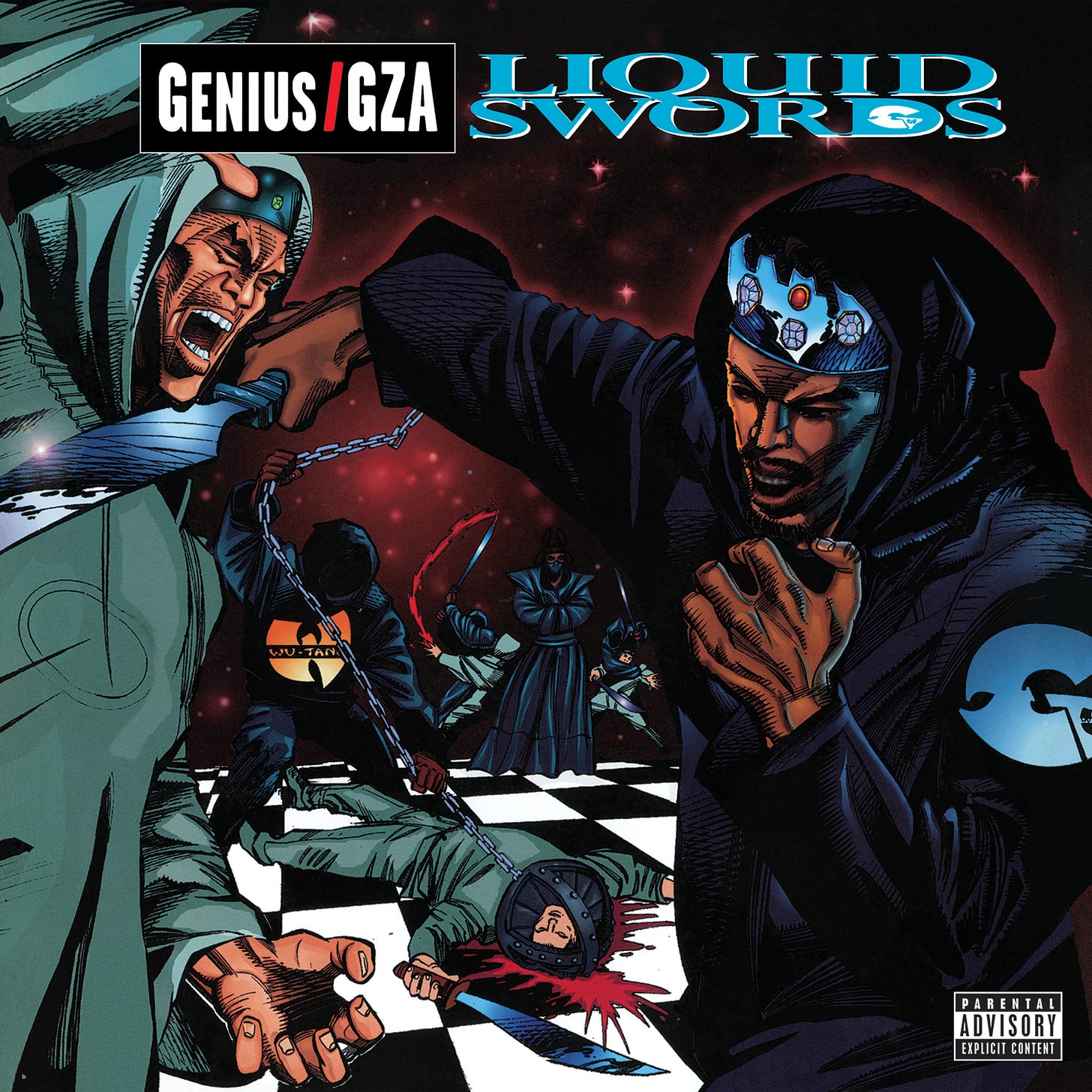Milestones: Liquid Swords by GZA
As people mistakenly labeled this as his second album, Liquid Swords by GZA became a slow burn for underground rap. No Wu album embodies the philosophy of rap as a martial art more intensely.
In the winters from 1995 to 1997, two iron rules applied. First: the last hang-out guest has to stand up when the pizza guy rings for the second time (and if you’re already up, please change the CD too). Second: after Wu comes more Wu — meaning, after Raekwon and Ghostface comes the whole crew: Method Man, ODB, and—above all—the GZA. His second album, Liquid Swords, usually didn’t make it into the stereo until late at night in those cold days. The brain was already fogged by various drugs like Dirk’s performance as a minister, and the present no longer mattered.
As soon as the film sample from the martial-arts movie “Shogun Assassin” starts, the trip into dream-slash-nightmare land begins. The borders between film and music blur into a single line. One moment you’re listening to the story of a samurai fighting evil ninjas, seconds later, GZA a.k.a. the Genius is verbally beheading all the fake MCs.
“Fake niggas get flipped/In mic fights I swing swords and cut Clowns.”
No album in Clan history lives the philosophy of rap as a martial art more ruthlessly. Leader RZA samples his way through sounds from ‘60s soul producer Willie Mitchell for the opening beat, but he compresses the loops so extremely that the sound thumps and rumbles in darkness. The hook “When the emcees came to live out the name ...” is an old routine RZA, ODB, and GZA had been doing since their youth at street battles. In its spit-out manner, it therefore sounds as untamed and raw as an early Pogues or punk record. A confused thought knocks through the nodding high-school senior’s head: Wu in the basement studio, us in the basement, doo-bee-doo.
But the nightmare from the Shogun film has you again in no time. “Ohh, mad one. We see your trap/You can never escape, your fate/Submit with honor to a duel, with my son/I agree.” And eons before the drunken master can even slur “sword,” “Duel of the Iron Mic” blasts from the speakers. Propulsive drums and a piano loop from David Porter’s “I’m Afraid the Masquerade Is Over” hypnotize even the hardest hood resident. GZA duels here with Inspectah Deck and Masta Killa, while Ol’ Dirty Bastard tears up the chorus line like Michael Douglas in the ’80s. By now, you’re pushing a full-blown mental movie like warehouse hands at Media Markt. Next come two tracks: “Living in the World Today” and “Gold”—that continue down the familiar, dark neck-breaker lane, but they’re really just announcing the four timeless hip-hop classics that follow. There’s no quartet of killer tracks in rap that eats through your guts and cells so tightly and seamlessly back-to-back. It starts with the only sung hook on the whole album. RZA slows the tempo on “Cold World” with Stevie Wonder and Dramatics samples; you think you’re getting a breather, but Life’s desperate, suffering refrain freezes it instantly:
“Babies crying, brothers dying, and brothers getting knocked
Shit is deep on the block, and you got me locked down
In this cold, cold world.”
After all the rap wordplay, GZA himself paints a convincing picture of gangsta life on the lonely, snow-covered streets of Staten Island: “It was the night before New Year’s, and all through the fuckin’ projects/Not a handgun was silent, not even a Tec/Outside as I’m stuck, by enemies who put fear/And blasted on the spot before the pigs were there.” So the last pitiful trace of a forgotten sun also sinks behind starless darkness. The basement grows cold, the drug high flips. In this mood, it’s no surprise that Nick Catucci wrote in the 2004 Rolling Stone Album Guide about Liquid Swords: “On the album, GZA went goth, painting the Wu’s street grime Black.”
He fires much more clearly and straight on the ton-heavy “Labels.” Over Thelma Houston’s “Don’t Leave Me This Way” sample, the already 29-year-old Gary Grice rages, from the legendary line “Tommy ain’t my motherfuckin’ Boy” onward, against the stranglehold contracts and antics of the record industry. He himself had been chewed up by the machinery of the music business in the early ‘90s, with no visible success. The track in which Gary weaves record-label names into, onto, and under one another is a prime example of meticulously placed syllables, and it later finds continuations in “Fame” (topic: Hollywood) and “Animal Planet.” People like 50 Cent call this style “brainy.” The G-Unit boss once said in an interview that Method Man was the Clan member who spoke to him most, while GZA had too little swagger and not enough street.
The Only Built 4 Mafia leftover “Hell Winds Staff/Killa Hills,” the “Investigative Reports,” and “Swordsman,” despite a brutally high standard, have a hard time sticking in the mind. “I Gotcha Back,” the successor to “Protect Ya Neck,” does better. With fanfares, it attacks the last nerve fibers while GZA drops cream-of-the-crop lines like “I’m trapped in a deadly video game with one man.” Amid all the syllable slinging, the stoned listener mutates into a rapper, and odd verses drift through the skull. For twelve tracks, GZA had painted the Wu world black; with the closing tune “B.I.B.L.E. (Basic Instructions Before Leaving Earth),” rapped entirely and profoundly by Killah Priest, he leads us away from the drugs, out of the basement into the daylight.
“Life is a test many quest the universe
And through my research, I felt the joy and the hurt
The first shall be last and the last shall be first
The basic instructions before leaving earth.”
Masterpiece (★★★★★)


